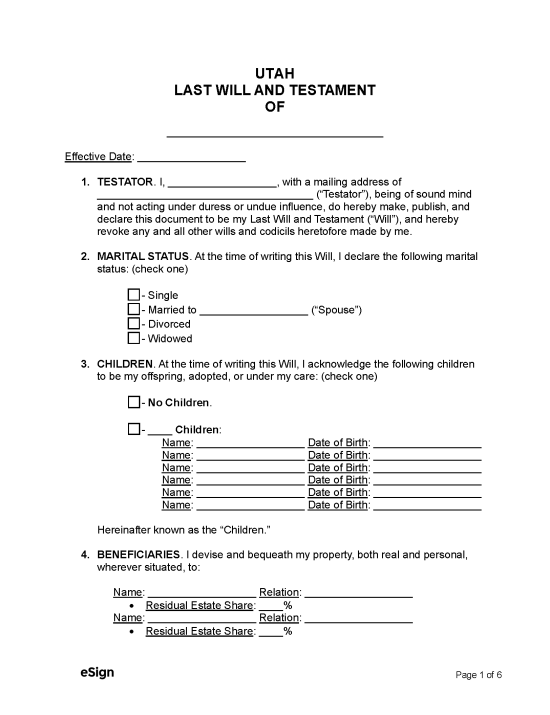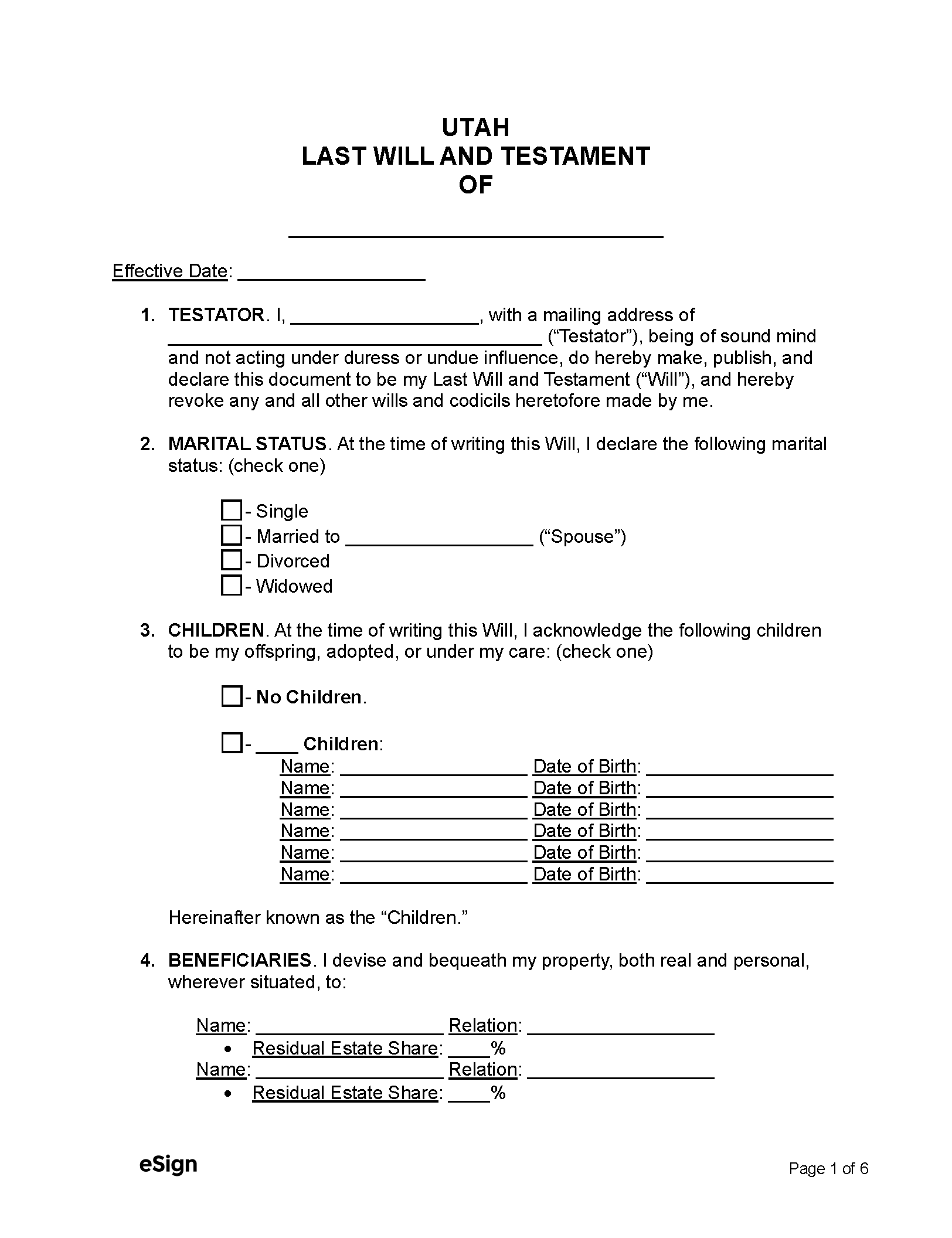State Laws
A person of sound mind and 18 years or older may create a will.[1]
Holographic Wills – Holographic wills are permissible as long as the will is entirely in the testator’s handwriting and bears their signature.[2]
Revocation – A will can be revoked in several ways:[3]
- By executing a new will with language specifically stating the previous will is invalid
- By executing a new will that is inconsistent with the previous one.
- By an act where the will is burned, torn, or destroyed.
- Through specific changes in circumstances, such as marriage, divorce, or homicide.[4]
Signing Requirements – The testator and two witnesses must sign wills in Utah.[5]
Probate Process in Utah (8 Steps)
In most cases, probate proceedings must occur within three years of the testator’s death.[6] Probate proceedings are generally “informal,” where the personal representative is appointed without a hearing. If interested parties disagree on the personal representative or other matters regarding distribution, the court must intervene and initiate “formal” probate proceedings.
- File Application
- Appoint the Personal Representative
- Post Bond (If Applicable)
- Receive Letters Testamentary
- Inventory and Appraise Assets
- Publish Notice to Creditors (If Applicable)
- Pay Debts and Taxes
- Close Estate
1. File Application
If the decedent’s estate is valued at $100,000 or less, then an Affidavit for Collecting Personal Property in a Small Estate Proceeding may be used to avoid probate.[7]
To begin probate proceedings, the individual who wants to act as personal representative must file several documents with the district court in the county where the decedent was living.[8] If the decedent did not live in Utah, probate may occur in the county where they owned property.
The following documents must be submitted to the court once at least 120 hours[9] have passed since the death of the decedent[10]:
-
-
- The original will
- A copy of the death certificate – This may be obtained via the Utah Vital Records and Statistics website.
- Application for Informal Probate of Will and Informal Appointment of Personal Representative – This form provides the court with initial information about the personal representative, the decedent’s survivors, and bond requirements. The application also asks the court to grant Letters Testamentary to the personal representative.
- Utah District Court Cover Sheet for Probate Actions – Gives the court information about the individual intending to be personal representative.
-
2. Appoint the Personal Representative
There are two ways that the court may appoint a personal representative:
1. Informal Manner
If the personal representative can get all interested persons to sign a Waiver of Notice, the court may approve their appointment without a hearing. The decedent’s heirs, beneficiaries, spouse, creditors, children, or any other party who has a claim against the estate is considered an interested person.[11]
If an heir or devisee listed in the will does not sign the Waiver of Notice, the clerk will send a written notice to those parties indicating that the personal representative has filed the Application for Informal Probate. If no party formally objects, the court may appoint the personal representative without a hearing.[12]
The court will use the Statement of Informal Probate of Will and Appointment of Personal Representative to approve the application, admit the will to probate, and determine whether a bond is required.
2. Formal Manner
If one of the interested parties objects to the personal representative’s appointment, they may file an Objection to Appointment of Personal Representative and Request for Hearing. The clerk will then be responsible for mailing a copy of the notice at least ten days before the hearing to each interested party.[13] Additionally, the clerk will post the notice in the county courthouse and at least two other public spaces. Once the hearing is held, the court will appoint a personal representative.
In every instance, the appointed personal representative must complete and submit an Acceptance of Appointment of Personal Representative, stating that they accept their duties and will carry them out as required by law.[14]
3. Post Bond (If Applicable)
In some cases, the personal representative may be required to post bond. This security measure protects heirs, beneficiaries, and creditors from any mistakes or wrongdoing by the personal representative.
A bond is only required if the will or another interested party demands it.[15]
4. Receive Letters Testamentary
When the personal representative is appointed and submits their Acceptance of Appointment and fulfills any bond requirements, the court will issue them Letters Testamentary. These letters prove to third parties, such as financial institutions, that the individual selected as personal representative has the authority to handle the decedent’s affairs.
5. Inventory and Appraise Assets
It will be the duty of the personal representative to prepare an inventory of the decedent’s assets owned at the time of death.[16] The document must indicate each listed item’s fair market value, any liens or encumbrances, and, if appraised, the name and address of any appraiser.[17]
This inventory must be completed within three months of the personal representative’s appointment. Any interested party who requests a copy of the inventory must be furnished with it. Though not required, the inventory may be submitted to the court.
6. Publish Notice to Creditors (If Applicable)
Generally, creditors will have a one-year window to make a claim against the estate.[18] If the personal representative wants to shorten this to a three-month window, they may post an Announcement of Appointment and Notice to Creditors in a local newspaper once a week for three consecutive weeks.[19]
7. Pay Debts and Taxes
Any valid creditor claims and applicable taxes must be paid before the estate can be distributed to the beneficiaries. However, the personal representative must ensure that funds cover any homestead, family, and support allowances before any creditor is paid.[20]
The personal representative must file the decedent’s final federal and state tax return. Utah does not impose an estate tax;[21] however, for large estates, the personal representative may need to pay a federal estate tax.[22]
8. Close Estate
After the estate has been administered and all taxes and claims have been paid, the personal representative may begin to close the estate. This must be at least four months after the decedent’s death and at least three months after the Announcement of Appointment and Notice to Creditors has been published, or one year if no notice was published.[23]
For informal probate proceedings, the personal representative may file a statement with the court stating that the personal representative performed their duties, distributed the estate properly, and sent a copy of the said statement to each distributee and creditor. The personal representative must complete and send a copy of the final accounting to each distributee unless they receive written consent indicating otherwise.
If probate is going through formal proceedings, the personal representative must submit a final accounting to the court and all beneficiaries.[24] The court will set a hearing date, and notice of that date must be sent to all interested persons. If the court approves the final distribution and no objections are made, the personal representative will be relieved of their duties.
Sources
- § 72-2-501
- § 72-2-502(2)
- § 75-2-507
- § 75-2-508
- § 72-2-502(1)
- § 72-3-107
- § 75-3-1201
- § 75-3-201
- § 75-3-307
- § 75-3-301
- § 75-1-201(24)
- § 75-3-306(2)
- § 75-1-401
- § 75-3-601
- § 75-3-603
- § 75-3-705
- § 75-3-706
- § 75-3-803
- § 75-3-801
- § 75-3-807
- Utah Inheritance Tax
- IRS Estate Tax Threshold
- § 75-3-1003
- § 75-3-1001

